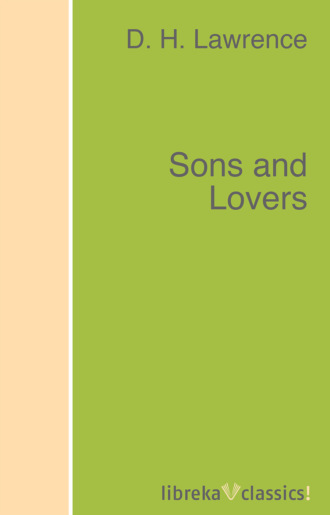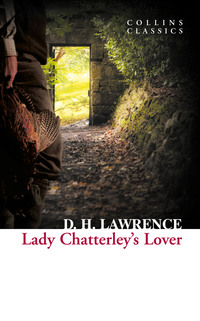
Полная версия
Sons and Lovers
"Then," said his mother, "you must look in the paper for the advertisements."
He looked at her. It seemed to him a bitter humiliation and an anguish to go through. But he said nothing. When he got up in the morning, his whole being was knotted up over this one thought:
"I've got to go and look for advertisements for a job."
It stood in front of the morning, that thought, killing all joy and even life, for him. His heart felt like a tight knot.
And then, at ten o'clock, he set off. He was supposed to be a queer, quiet child. Going up the sunny street of the little town, he felt as if all the folk he met said to themselves: "He's going to the Co-op. reading-room to look in the papers for a place. He can't get a job. I suppose he's living on his mother." Then he crept up the stone stairs behind the drapery shop at the Co-op., and peeped in the reading-room. Usually one or two men were there, either old, useless fellows, or colliers "on the club". So he entered, full of shrinking and suffering when they looked up, seated himself at the table, and pretended to scan the news. He knew they would think: "What does a lad of thirteen want in a reading-room with a newspaper?" and he suffered.
Then he looked wistfully out of the window. Already he was a prisoner of industrialism. Large sunflowers stared over the old red wall of the garden opposite, looking in their jolly way down on the women who were hurrying with something for dinner. The valley was full of corn, brightening in the sun. Two collieries, among the fields, waved their small white plumes of steam. Far off on the hills were the woods of Annesley, dark and fascinating. Already his heart went down. He was being taken into bondage. His freedom in the beloved home valley was going now.
The brewers' waggons came rolling up from Keston with enormous barrels, four a side, like beans in a burst bean-pod. The waggoner, throned aloft, rolling massively in his seat, was not so much below Paul's eye. The man's hair, on his small, bullet head, was bleached almost white by the sun, and on his thick red arms, rocking idly on his sack apron, the white hairs glistened. His red face shone and was almost asleep with sunshine. The horses, handsome and brown, went on by themselves, looking by far the masters of the show.
Paul wished he were stupid. "I wish," he thought to himself, "I was fat like him, and like a dog in the sun. I wish I was a pig and a brewer's waggoner."
Then, the room being at last empty, he would hastily copy an advertisement on a scrap of paper, then another, and slip out in immense relief. His mother would scan over his copies.
"Yes," she said, "you may try."
William had written out a letter of application, couched in admirable business language, which Paul copied, with variations. The boy's handwriting was execrable, so that William, who did all things well, got into a fever of impatience.
The elder brother was becoming quite swanky. In London he found that he could associate with men far above his Bestwood friends in station. Some of the clerks in the office had studied for the law, and were more or less going through a kind of apprenticeship. William always made friends among men wherever he went, he was so jolly. Therefore he was soon visiting and staying in houses of men who, in Bestwood, would have looked down on the unapproachable bank manager, and would merely have called indifferently on the Rector. So he began to fancy himself as a great gun. He was, indeed, rather surprised at the ease with which he became a gentleman.
His mother was glad, he seemed so pleased. And his lodging in Walthamstow was so dreary. But now there seemed to come a kind of fever into the young man's letters. He was unsettled by all the change, he did not stand firm on his own feet, but seemed to spin rather giddily on the quick current of the new life. His mother was anxious for him. She could feel him losing himself. He had danced and gone to the theatre, boated on the river, been out with friends; and she knew he sat up afterwards in his cold bedroom grinding away at Latin, because he intended to get on in his office, and in the law as much as he could. He never sent his mother any money now. It was all taken, the little he had, for his own life. And she did not want any, except sometimes, when she was in a tight corner, and when ten shillings would have saved her much worry. She still dreamed of William, and of what he would do, with herself behind him. Never for a minute would she admit to herself how heavy and anxious her heart was because of him.
Also he talked a good deal now of a girl he had met at a dance, a handsome brunette, quite young, and a lady, after whom the men were running thick and fast.
"I wonder if you would run, my boy," his mother wrote to him, "unless you saw all the other men chasing her too. You feel safe enough and vain enough in a crowd. But take care, and see how you feel when you find yourself alone, and in triumph." William resented these things, and continued the chase. He had taken the girl on the river. "If you saw her, mother, you would know how I feel. Tall and elegant, with the clearest of clear, transparent olive complexions, hair as black as jet, and such grey eyes—bright, mocking, like lights on water at night. It is all very well to be a bit satirical till you see her. And she dresses as well as any woman in London. I tell you, your son doesn't half put his head up when she goes walking down Piccadilly with him."
Mrs. Morel wondered, in her heart, if her son did not go walking down Piccadilly with an elegant figure and fine clothes, rather than with a woman who was near to him. But she congratulated him in her doubtful fashion. And, as she stood over the washing-tub, the mother brooded over her son. She saw him saddled with an elegant and expensive wife, earning little money, dragging along and getting draggled in some small, ugly house in a suburb. "But there," she told herself, "I am very likely a silly—meeting trouble halfway." Nevertheless, the load of anxiety scarcely ever left her heart, lest William should do the wrong thing by himself.
Presently, Paul was bidden call upon Thomas Jordan, Manufacturer of Surgical Appliances, at 21, Spaniel Row, Nottingham. Mrs. Morel was all joy.
"There, you see!" she cried, her eyes shining. "You've only written four letters, and the third is answered. You're lucky, my boy, as I always said you were."
Paul looked at the picture of a wooden leg, adorned with elastic stockings and other appliances, that figured on Mr. Jordan's notepaper, and he felt alarmed. He had not known that elastic stockings existed. And he seemed to feel the business world, with its regulated system of values, and its impersonality, and he dreaded it. It seemed monstrous also that a business could be run on wooden legs.
Mother and son set off together one Tuesday morning. It was August and blazing hot. Paul walked with something screwed up tight inside him. He would have suffered much physical pain rather than this unreasonable suffering at being exposed to strangers, to be accepted or rejected. Yet he chattered away with his mother. He would never have confessed to her how he suffered over these things, and she only partly guessed. She was gay, like a sweetheart. She stood in front of the ticket-office at Bestwood, and Paul watched her take from her purse the money for the tickets. As he saw her hands in their old black kid gloves getting the silver out of the worn purse, his heart contracted with pain of love of her.
She was quite excited, and quite gay. He suffered because she WOULD talk aloud in presence of the other travellers.
"Now look at that silly cow!" she said, "careering round as if it thought it was a circus."
"It's most likely a bottfly," he said very low.
"A what?" she asked brightly and unashamed.
They thought a while. He was sensible all the time of having her opposite him. Suddenly their eyes met, and she smiled to him—a rare, intimate smile, beautiful with brightness and love. Then each looked out of the window.
The sixteen slow miles of railway journey passed. The mother and son walked down Station Street, feeling the excitement of lovers having an adventure together. In Carrington Street they stopped to hang over the parapet and look at the barges on the canal below.
"It's just like Venice," he said, seeing the sunshine on the water that lay between high factory walls.
"Perhaps," she answered, smiling.
They enjoyed the shops immensely.
"Now you see that blouse," she would say, "wouldn't that just suit our Annie? And for one-and-eleven-three. Isn't that cheap?"
"And made of needlework as well," he said.
"Yes."
They had plenty of time, so they did not hurry. The town was strange and delightful to them. But the boy was tied up inside in a knot of apprehension. He dreaded the interview with Thomas Jordan.
It was nearly eleven o'clock by St. Peter's Church. They turned up a narrow street that led to the Castle. It was gloomy and old-fashioned, having low dark shops and dark green house doors with brass knockers, and yellow-ochred doorsteps projecting on to the pavement; then another old shop whose small window looked like a cunning, half-shut eye. Mother and son went cautiously, looking everywhere for "Thomas Jordan and Son". It was like hunting in some wild place. They were on tiptoe of excitement.
Suddenly they spied a big, dark archway, in which were names of various firms, Thomas Jordan among them.
"Here it is!" said Mrs. Morel. "But now WHERE is it?"
They looked round. On one side was a queer, dark, cardboard factory, on the other a Commercial Hotel.
"It's up the entry," said Paul.
And they ventured under the archway, as into the jaws of the dragon. They emerged into a wide yard, like a well, with buildings all round. It was littered with straw and boxes, and cardboard. The sunshine actually caught one crate whose straw was streaming on to the yard like gold. But elsewhere the place was like a pit. There were several doors, and two flights of steps. Straight in front, on a dirty glass door at the top of a staircase, loomed the ominous words "Thomas Jordan and Son—Surgical Appliances." Mrs. Morel went first, her son followed her. Charles I mounted his scaffold with a lighter heart than had Paul Morel as he followed his mother up the dirty steps to the dirty door.
She pushed open the door, and stood in pleased surprise. In front of her was a big warehouse, with creamy paper parcels everywhere, and clerks, with their shirt-sleeves rolled back, were going about in an at-home sort of way. The light was subdued, the glossy cream parcels seemed luminous, the counters were of dark brown wood. All was quiet and very homely. Mrs. Morel took two steps forward, then waited. Paul stood behind her. She had on her Sunday bonnet and a black veil; he wore a boy's broad white collar and a Norfolk suit.
One of the clerks looked up. He was thin and tall, with a small face. His way of looking was alert. Then he glanced round to the other end of the room, where was a glass office. And then he came forward. He did not say anything, but leaned in a gentle, inquiring fashion towards Mrs. Morel.
"Can I see Mr. Jordan?" she asked.
"I'll fetch him," answered the young man.
He went down to the glass office. A red-faced, white-whiskered old man looked up. He reminded Paul of a pomeranian dog. Then the same little man came up the room. He had short legs, was rather stout, and wore an alpaca jacket. So, with one ear up, as it were, he came stoutly and inquiringly down the room.
"Good-morning!" he said, hesitating before Mrs. Morel, in doubt as to whether she were a customer or not.
"Good-morning. I came with my son, Paul Morel. You asked him to call this morning."
"Come this way," said Mr. Jordan, in a rather snappy little manner intended to be businesslike.
They followed the manufacturer into a grubby little room, upholstered in black American leather, glossy with the rubbing of many customers. On the table was a pile of trusses, yellow wash-leather hoops tangled together. They looked new and living. Paul sniffed the odour of new wash-leather. He wondered what the things were. By this time he was so much stunned that he only noticed the outside things.
"Sit down!" said Mr. Jordan, irritably pointing Mrs. Morel to a horse-hair chair. She sat on the edge in an uncertain fashion. Then the little old man fidgeted and found a paper.
"Did you write this letter?" he snapped, thrusting what Paul recognised as his own notepaper in front of him.
"Yes," he answered.
At that moment he was occupied in two ways: first, in feeling guilty for telling a lie, since William had composed the letter; second, in wondering why his letter seemed so strange and different, in the fat, red hand of the man, from what it had been when it lay on the kitchen table. It was like part of himself, gone astray. He resented the way the man held it.
"Where did you learn to write?" said the old man crossly.
Paul merely looked at him shamedly, and did not answer.
"He IS a bad writer," put in Mrs. Morel apologetically. Then she pushed up her veil. Paul hated her for not being prouder with this common little man, and he loved her face clear of the veil.
"And you say you know French?" inquired the little man, still sharply.
"Yes," said Paul.
"What school did you go to?"
"The Board-school."
"And did you learn it there?"
"No—I—" The boy went crimson and got no farther.
"His godfather gave him lessons," said Mrs. Morel, half pleading and rather distant.
Mr. Jordan hesitated. Then, in his irritable manner—he always seemed to keep his hands ready for action—he pulled another sheet of paper from his pocket, unfolded it. The paper made a crackling noise. He handed it to Paul.
Конец ознакомительного фрагмента.
Текст предоставлен ООО «ЛитРес».
Прочитайте эту книгу целиком, купив полную легальную версию на ЛитРес.
Безопасно оплатить книгу можно банковской картой Visa, MasterCard, Maestro, со счета мобильного телефона, с платежного терминала, в салоне МТС или Связной, через PayPal, WebMoney, Яндекс.Деньги, QIWI Кошелек, бонусными картами или другим удобным Вам способом.




